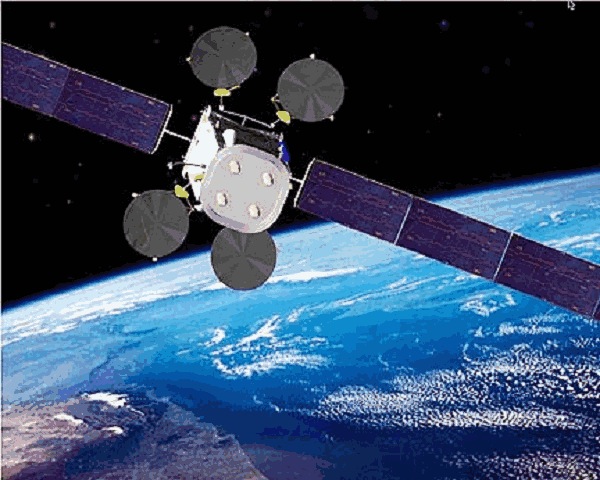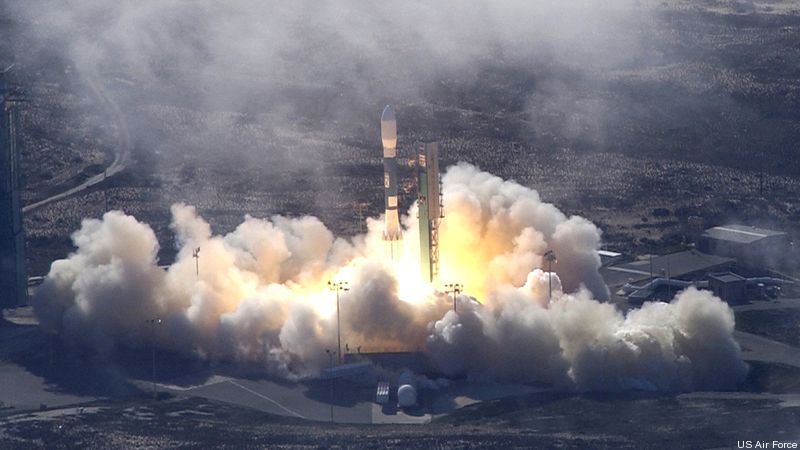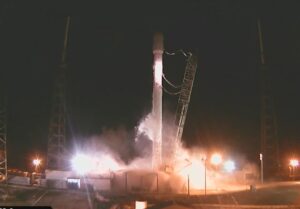Stop The Fearmongering Over War In Space: The Sky’s Not Falling, Part 1
Posted on

Star Wars it ain’t, but the Pentagon is increasingly anxious over threats to its satellites, as we’ve reported frequently in recent years. But in this op-ed, scholars Joan Johnson-Freese and Theresa Hitchens argue that war in space is dangerously overhyped. — the editors
In the last two years, we’ve seen rising hysteria over a future war in space. Fanning the flames are not only dire assessments from the US military, but also breathless coverage from a cooperative and credulous press. This reporting doesn’t only muddy public debate over whether we really need expensive systems. It could also become a self-fulfilling prophecy. The irony is that nothing makes the currently slim possibility of war in space more likely than fearmongering over the threat of war in space.
Two television programs in the past two years show how egregious this fearmongering can get. In April 2015, the CBS show 60 Minutes ran a segment called “The Battle Above.” In an interview with General John Hyten, the then-chief of U.S. Air Force Space Command, it came across loud and clear that the United States was being forced to prepare for a battle in space — specifically against China — that it really didn’t want.
Gen. John Hyten: It’s a competition that I wish wasn’t occurring, but it is. And if we’re threatened in space, we have the right of self-defense, and we’ll make sure we can execute that right.
David Martin: And use force if necessary.
Gen. John Hyten: That’s why we have a military. You know, I’m not NASA.
It was explained by Hyten and other guests that China is building a considerable amount of hardware and accumulating significant know-how regarding space, all threatening to space assets Americans depend on every day. If viewers weren’t frightened after watching the segment, it wasn’t for lack of trying on the part of CBS.
Using terms like “offensive counterspace” as a 1984 NewSpeak euphemism for “weapons,” it was made clear that the United States had no choice but to spend billions of dollars on offensive counterspace technology to not just thwart the Chinese threat, but control and dominate space. While it didn’t actually distort facts — just omit facts about current U.S. space capabilities — the segment was basically a cost-free commercial for the military-industrial complex.
CNN’s “The Next Battlefield”
In retrospect though, “The Battle Above” was pretty good compared to CNN’s recent special, War in Space: The Next Battlefield. The latter might as well have been called Sharknado in Space – because the only far-out weapons technology our potential adversaries don’t have, according to the broadcast, seems to be “sharks with frickin’ laser beams attached to their heads!”
First, CNN needs to hire some fact checkers. Saying “unlike its adversaries, the U.S. has not yet weaponized space” is deeply misleading, like saying “unlike his political opponents, President-Elect Donald Trump has not sprouted wings and flown away”: A few (admittedly alarming) weapons tests aside, no country in the world has yet weaponized space. Contrary to CNN, stock market transactions are not timed nor synchronized through GPS, but a closed system. Cruise missiles can find their targets even without GPS, because they have both GPS and precision inertial measurement units onboard, and IMUs don’t rely on satellite data. Oh, and the British rock group Pink Floyd holds the only claim to the Dark Side of the Moon: There is a “far side” of the Moon — the side always turned away from the Earth — but not a “dark side” — which would be a side always turned away from the Sun.
More nefariously, the segment sensationalized nuggets of truth within a barrage of half-truths, backed by a heavy bass, dramatic soundtrack (and gravelly-voiced reporter Jim Sciutto) and accompanied by sexy and scary visuals.
Make no mistake there are dangers in space, and the United States has the most to lose if space assets are lost. The question is how best to protect them. Here are a few facts CNN omitted.

The Reality
The U.S. has all of the technologies described on the CNN segment and deemed potentially offensive: maneuverable satellites, nano-satellites, lasers, jamming capabilities, robotic arms, ballistic missiles that can be used as anti-satellite weapons, etc. In fact, the United States is more technologically advanced than other countries in both military and commercial space.
That technological superiority scares other countries; just as the U.S. military space community is scared of other countries obtaining those technologies in the future. The U.S. military space budget is more than 10 times greater than that of all the countries in the world combined. That also causes other countries concern.
More unsettling still, the United States has long been leery of treaty-based efforts to constrain a potential arms race in outer space, as supported by nearly every other country in the world for decades. Indeed, under the administration of George W. Bush, the U.S. talking points centered on the mantra “there is no arms race in outer space,” so there is no need for diplomat instruments to constrain one. Now, a decade later, the U.S. military – backed by the Intelligence Community which operates the nation’s spy satellites – seems to be shouting to the rooftops that the United States is in danger of losing the space arms race already begun by its potential adversaries. The underlying assumption — a convenient one for advocates of more military spending — is that now there is nothing that diplomacy can do.

SpaceX Falcon 9 rocket
However, it must be remembered that most space-related technologies – with the exception of ballistic missiles and dedicated jammers – have both military and civil/commercial uses; both benign — indeed, helpful — and nefarious uses. For example, giving satellites the ability to maneuver on orbit can allow useful inspections of ailing satellites and possibly even repairs.
Further, the United States is not unable to protect its satellites, as repeated during the CNN broadcast by various interviewees and the host. Many U.S. government-owned satellites, including precious spy satellites, have capabilities to maneuver. Many are hardened against electro-magnetic pulse, sport “shutters” to protect optical “eyes” from solar flares and lasers, and use radio frequency hopping to resist jamming.
Offensive weapons, deployed on the ground to attack satellites, or in space, are not a silver bullet. To the contrary, U.S. deployment of such weapons may actually be detrimental to U.S. and international security in space (as we argued in a recent Atlantic Council publication, Towards a New National Security Space Strategy). Further, there are benefits to efforts started by the Obama Administration to find diplomatic tools to restrain and constrain dangerous military activities in space.
These diplomatic efforts, however, would be undercut by a full-out U.S. pursuit of “space dominance.” This includes dialogue with China, the lack of which Gen. William Shelton, retired commander of Air Force Space Command, lamented in the CNN report.
Given CNN’s “cast,” the spin was not surprising. Starting with Ghost Fleet author Peter Singer set the sensationalist tone, which never altered. The apocalyptic opening, inspired by Ghost Fleet, posited a scenario where all U.S. satellites are taken off-line in nearly one fell swoop. Unless we are talking about an alien invasion, that scenario is nigh on impossible. No potential adversary has such capabilities, nor will they ever likely do so. There is just too much redundancy in the system.
General Hyten, now head of U.S. Strategic Command, has perfected his sound bites regarding the threats. Other military officials – and of course a DoD contractor – gave what should be expected as their (worst case) perspectives. But theirs is not the only perspective. And no alternate views were offered.
The whole show reached its crescendo when “the answer” was revealed toward the end. The U.S. military needs more of everything. It needs to have such overwhelming “stuff” that nobody would dare attack U.S. assets. It needs an offensive arsenal. It needs more money. CNN certainly did its part in scaring the bejesus out of the American public and Congress – and thus helping the Pentagon make its case.
In Part II of this article, out tomorrow, we’ll explain how US policy went down this alarmist rabbit hole and how to get it back on track.

Joan Johnson-Freese
Dr. Joan Johnson-Freese is a member of the Breaking Defense Board of Contributors, a Professor of National Security Affairs at the Naval War College and author of Space Warfare in the 21st Century: Arming the Heavens. Views expressed are those of the author alone.
Theresa Hitchens is a Senior Research Scholar at the Center for International and Security Studies at Maryland (CISSM), and the former Director of the United Nations Institute for Disarmament Research (UNIDIR) in Geneva, Switzerland.
Subscribe to our newsletter
Promotions, new products and sales. Directly to your inbox.

